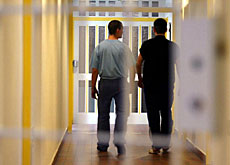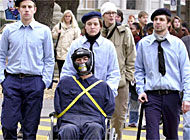Switzerland seen as easy target

Crime experts say Switzerland is seen as easy pickings by foreign criminals, who make up two-thirds of the prison population.
But social factors also account for the fact that the number of foreigners in Swiss prisons has more than doubled in the past ten years.
Compared with other countries, Swiss rates of incarceration are low. Prisoners account for 71 people in 100,000 compared with 85 in France and 96 in Germany and 700 in the United States, which is the world’s biggest jailer, according to the International Centre for Prison Studies.
Hans Zoss, director of the Thorberg penitentiary outside the capital Bern, says foreign nationals from around 30 countries are behind bars, with most coming from Albania, Macedonia, Bosnia, Croatia and the former Yugoslav Republic.
Many people fled these countries during the Balkans war in the late 1990s.
“We have a large number of prisoners [from the Balkans] at the moment but it’s decreasing because the political situation is calming down,” he told swissinfo.
Drug offences
In Thorberg, a high-security prison, most of the foreign criminals are serving time for drug offences.
“In my prison 76 of the 150 inmates are here because they broke the drugs law [and] most of them were dealers,” Zoss says. “We also have foreigners who have committed serious violent crimes such as murder, but they are not in the majority.”
He adds that foreign inmates usually fall into three main categories – asylum seekers, criminal tourists and long-term residents who have never been granted citizenship.
For Zoss, the disproportionate number of foreigners in Swiss prisons has much to do with the difficult circumstances facing many immigrants.
“There’s a tendency to be more violent and [to revert to] theft and other criminal behaviour because of their social situation. Many people are in uncertain situations with no clear future.”
Asylum seekers
This is seen as especially true of asylum seekers, who make up seven per cent of Switzerland’s foreign inmates.
Beat Hegg, the general-secretary of Switzerland’s cantonal conference of police and justice directors doubts that all asylum claims are genuine. He suggests that many foreigners come to Switzerland looking for work.
“Less than ten per cent of asylum seekers are granted asylum in Switzerland so I think a lot of them come here saying they’re asylum seekers but in fact they’d like to get work here,” he explains.
“They can’t get work permits, so many have to go home and those who do not want to go back try to find other ways of earning money and this could be through crime.”
Delinquent behaviour
But Daniel Fink, head of the Swiss crime statistics section at the Federal Office for statistics, says culture, gender and age also play a role.
“Foreigners are used to dealing with conflict in different ways,” Fink told swissinfo. “The vast majority of asylum seekers are young males between 15 and 25 years old and delinquent behaviour is a fact of life for men of this age.
“It’s linked to growing up and having to prove certain things [which leads to] fighting, driving fast and alcohol. This is even more exaggerated if you have experienced war or deprivation.”
Fink believes that people in such circumstances – and denied the possibility of getting a job – are more likely to turn to crime, particularly when confronted with the trappings of life in Switzerland.
“Everything seems so available and up for grabs” in Switzerland, he says. “Think of supermarkets, think of the cars available compared to other countries. It’s not surprising that these people having sought asylum [want to be part of it]”.
Criminal tourism
Fink says Switzerland is also seen as easy pickings for criminals in neighbouring countries, who come across the border to places like Geneva, commit a crime and then go home.
“We have reports from police who have found stockpiled stolen goods, which are obviously being prepared for export,” says Fink. “We also know that stolen cars have been transported to most eastern European countries.”
The problem is expected to get worse as border controls are loosened as part of Switzerland’s bilateral treaties with the European Union.
Andre Vallotton, head of the prison service in the canton of Vaud, says Switzerland is now in a similar position to Luxembourg, which has 80 prisoners per 100 000 inhabitants, of which 60 per cent are foreigners.
He explained that Switzerland’s geographical position had contributed to the high total of foreigners in its prisons – a view shared by Hegg, who believes criminal tourism is the main reason behind the large numbers.
“Switzerland is a central country in Europe, there’s a lot of money, so people come here to commit crimes [and many end up in jail],” Hegg told swissinfo.
“Geneva, for example, is the crime centre for the Lyon region,” adds Valleton, “and the same phenomenon is true of the [border regions of] Basel or even Ticino.”
Swiss exception?
Switzerland would seem to stand apart in the number of foreigners in its prisons. They account for nearly 63 per cent of the prison population.
Official statistics show that in France, for example, foreigners account for 28.5 per cent of the prison population while in Germany it’s 34 per cent and 28.5 per cent in Italy.
But Fink says that in reality other European countries lock up a similar proportion of foreigners.
“If you take France, it’s a melting pot of races,” he says. “It is easier for foreigners to integrate and obtain French citizenship”.
He adds that in Switzerland it’s harder to become a national, where even people who are born and grow up here and who speak the national languages have to apply to become a citizen.
If these people commit a crime in Switzerland, they are classed as foreigners; anywhere else they would be seen as locals.
André Vallotton believes that the high percentage – some 30 per cent – of foreigners living in Switzerland may be an additional factor.
“And some are also criminals,” he says. “But not any more so than the Swiss.”
The latest statistics show that 5,160 people were behind bars in Switzerland in September 2001.
swissinfo, Sally Mules
Nearly 63 per cent of inmates in Swiss prisons are foreigners.
Prisoners come from more than 30 countries.
A quarter of them are sentenced for drugs crimes.
Seven per cent are asylum seekers.
There are 167 prisons in Switzerland.

In compliance with the JTI standards
More: SWI swissinfo.ch certified by the Journalism Trust Initiative












You can find an overview of ongoing debates with our journalists here . Please join us!
If you want to start a conversation about a topic raised in this article or want to report factual errors, email us at english@swissinfo.ch.